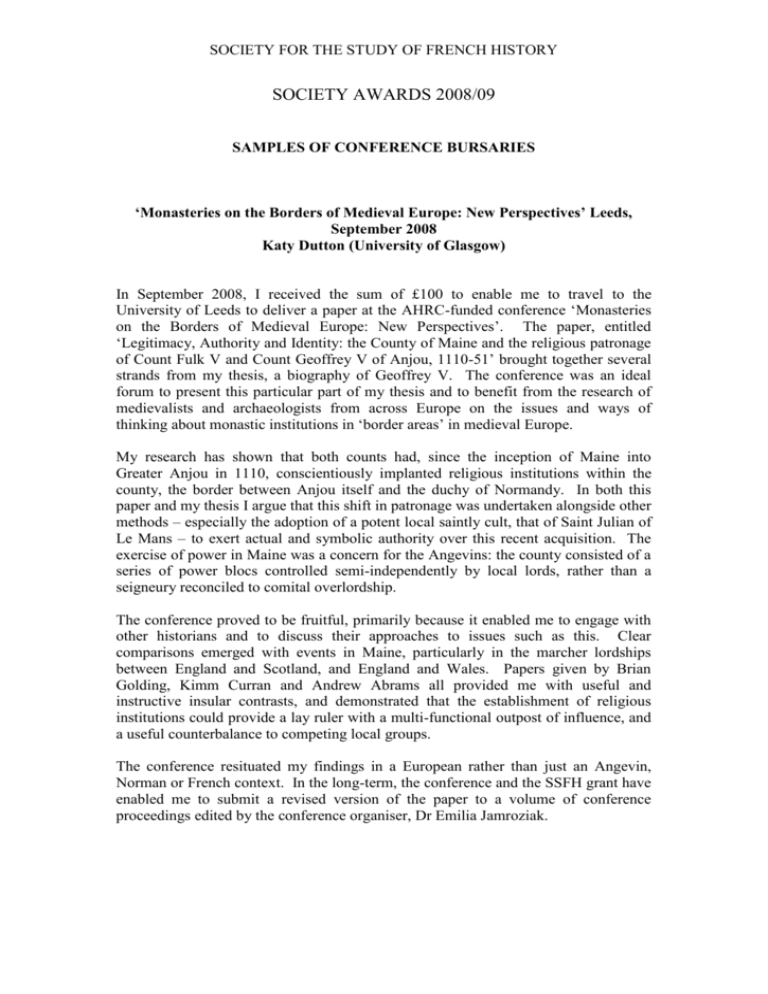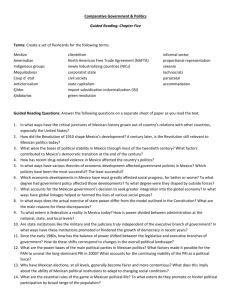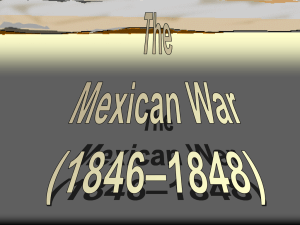2008/09 - The Society for the Study of French History
advertisement

SOCIETY FOR THE STUDY OF FRENCH HISTORY SOCIETY AWARDS 2008/09 SAMPLES OF CONFERENCE BURSARIES ‘Monasteries on the Borders of Medieval Europe: New Perspectives’ Leeds, September 2008 Katy Dutton (University of Glasgow) In September 2008, I received the sum of £100 to enable me to travel to the University of Leeds to deliver a paper at the AHRC-funded conference ‘Monasteries on the Borders of Medieval Europe: New Perspectives’. The paper, entitled ‘Legitimacy, Authority and Identity: the County of Maine and the religious patronage of Count Fulk V and Count Geoffrey V of Anjou, 1110-51’ brought together several strands from my thesis, a biography of Geoffrey V. The conference was an ideal forum to present this particular part of my thesis and to benefit from the research of medievalists and archaeologists from across Europe on the issues and ways of thinking about monastic institutions in ‘border areas’ in medieval Europe. My research has shown that both counts had, since the inception of Maine into Greater Anjou in 1110, conscientiously implanted religious institutions within the county, the border between Anjou itself and the duchy of Normandy. In both this paper and my thesis I argue that this shift in patronage was undertaken alongside other methods – especially the adoption of a potent local saintly cult, that of Saint Julian of Le Mans – to exert actual and symbolic authority over this recent acquisition. The exercise of power in Maine was a concern for the Angevins: the county consisted of a series of power blocs controlled semi-independently by local lords, rather than a seigneury reconciled to comital overlordship. The conference proved to be fruitful, primarily because it enabled me to engage with other historians and to discuss their approaches to issues such as this. Clear comparisons emerged with events in Maine, particularly in the marcher lordships between England and Scotland, and England and Wales. Papers given by Brian Golding, Kimm Curran and Andrew Abrams all provided me with useful and instructive insular contrasts, and demonstrated that the establishment of religious institutions could provide a lay ruler with a multi-functional outpost of influence, and a useful counterbalance to competing local groups. The conference resituated my findings in a European rather than just an Angevin, Norman or French context. In the long-term, the conference and the SSFH grant have enabled me to submit a revised version of the paper to a volume of conference proceedings edited by the conference organiser, Dr Emilia Jamroziak. SOCIETY FOR THE STUDY OF FRENCH HISTORY ‘Colloque sur l’intervention francaise au Mexique’ Paris, November 2008 Tina Schwenk (University of Stirling) The conference on the French intervention in Mexico held on 27th and 28th November 2008 at the Sorbonne University in Paris proved to be very interesting due to the fact that the choice of different speakers from France and Mexico did not only cover a wide range of topics but that they also tried to show both sides to the French intervention in Mexico. The conference was centred around three main points: the French military intervention in Mexico and the resulting cultural and scientific impacts in the two countries. Jacques-Olivier Boudoun demonstrated in his talk about French pastors in Mexico showed a relatively unknown side of the intervention. Jean-David Avenel, on the other hand, spoke about the role the French press played during the intervention by influencing public opinion in France. Raul Figueroa Esquer showed the Mexican side of the occupation by examining the rise and fall of Francisco de Paula de Arrangioz, a Mexican supporter of the French intervention. The cultural influences of the intervention were bigger in Mexico than in France. Eugenia Revueltas Acevedo proved in her presentation that the French occupation of Mexico had a major influence on the Mexican elites as well as on Mexican literature and the press. The impact of Mexican influences on the French culture was less significant, apart from the Mexican contribution to the World Exhibition in Paris in 1867 (Michael Carmona / Christiane Demeulenaere-Douyere) The scientific impact of the French intervention in Mexico, through the “Commission scientific du Mexique”, was much more important and profitable for both sides. Several speakers such as Claire Fredj, Magdalena Martinez Guzman and Hector Gonzalez Medrano described the motives and medical results of French doctors, who went to Mexico during the intervention in order to examine diseases such as malaria and yellow fever. All in all the “college sur l’intervention francaise au Mexique” proved to be very diverse and interesting. Although, it would have been beneficial to see how Emperor Maximilian and Empress Charlotte influenced the event in Mexico, in terms of the military, culture and science. Annual Conference of the Western Society for French History, Quebec City, November 2008 Robert Priest (University of Oxford) This year the conference of the Western Society for French History was held against the dramatic backdrop of Quebec City, which was celebrating its 400th anniversary. As one of North America's major international French history conferences, the Western attracts a substantial number of participants from across the continent, as well as a sizeable delegation of Europeans. In all, there were nearly 300 active participants, with between seven and eight parallel panels running across two and a half days. SOCIETY FOR THE STUDY OF FRENCH HISTORY For the meeting I had organised a panel on "Science, Religion and Education in the Late Nineteenth Century." This featured my own paper on Ernest Renan's female correspondents and their reactions to his controversial Vie de Jésus (1863); Joel Revill’s examination of Emile Boutroux, a fin-de-siècle Catholic philosopher who attempted to reconcile science and religion through the problem of free will; and finally Frances Kelleher’s paper on the practical problems with the "laicisation" of French schooling during the Third Republic. Comment was offered by Carol Harrison from the University of South Carolina, who offered an extremely helpful and provocative commentary which has helped sharpen my ideas on the significance of gender in my sources. These considerations will certainly find their way into my final thesis. I also received some productive questions, for example on the parallel between Renan's book's revivification of the Gospel narrative and the reality which spiritisme (the French incarnation of spiritualism) appeared to grant its adherents in the same period. The conference furnished me with the opportunity to see a huge number of stimulating papers, and it was especially gratifying to see names that had long haunted my bibliographies finally brought to life. Among panels I attended, one of the most stimulating discussions surrounded the session 'Can historians be creative and get away with it?' In this unorthodox session, the feminist social historian Rachel Fuchs considered original ways to fill in the narrative gaps of her current project on nineteenth-century abortion. As a twist, she did so in dialogue with an American fiction writer. I was also particularly struck by some of the issues raised during panels on the history of the concept of genius, and on religion and education in modern France. Given the conference's setting, panels were tied together by lunchtime speeches on the history of New France, from French colonists' encounters with indigenous tattooing, to Charles de Gaulle's notorious "Vive le Québec libre!" speech in Montreal. In all, a hugely interesting and enjoyable event which, quite apart from the benefits for my own work, served as a reminder of the insights to be gleaned from paying attention to work across the whole chronological and thematic breadth of French history; a lesson which can easily be forgotten in the midst of researching a tightly-defined doctoral thesis.






